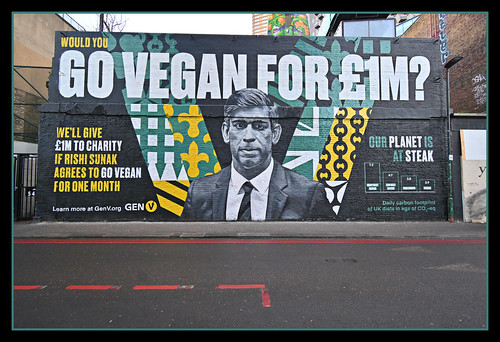Rishi Sunak and Sir Keir Starmer: who would actually bring change?
Sunak #Sunak

At the Labour Party’s conference in Liverpool in October 2023, Sir Keir Starmer spoke at a breakfast for business leaders. His host asked the Labour leader for predictions for the year ahead.
First, Sir Keir said, his party would be ready to fight a general election in May 2024. The election must be held by January 2025, and the date is in the gift of Rishi Sunak, the prime minister. Many in the Conservative Party think October is their best option as that would allow inflation to abate and incomes to recover. But Labour officials think Mr Sunak is more likely to want to align with the local-government elections in May, because a bad result for the Tories in those would hobble it for an autumn campaign.
Second, said Sir Keir, it will get dirty. That looks a safe enough bet. The Tories portray Sir Keir as an indecisive metropolitan who is soft on crime and migration. Labour portrays Mr Sunak as a weak, aloof moneybags who surveys the country from a helicopter. Neither man—a teetotal banker and a pescatarian human-rights lawyer—is a brawler by disposition. They will slug it out nonetheless.
Third, he said the election will be dominated by the economy. No great surprise there, either. The state of the economy overtook health as voters’ most important issue in January 2022. Labour will focus on the cost-of-living squeeze. Rachel Reeves, the shadow chancellor, likes to riff on Ronald Reagan’s question from the American presidential election in 1980, asking: “Ask yourself this: are you and your family better off than you were 13 years ago?”
Labour has outlined a programme of subsidies and home-building deregulation which it claims can kick-start growth. It has held a lead in polls as the best party to manage the economy since Liz Truss’s disastrous mini-budget of October 2022. But the lead is hardly hegemonic. Expect the Tories to hammer away at voters’ lingering doubts about Labour’s fiscal rectitude. A proposed programme of £28bn ($34bn) a year in green subsidies, announced by Labour in 2021 when borrowing costs were low, has become a liability the Tories will seek to exploit.
The Tories say Sir Keir is indecisive, and soft on crime and migration
The state of public services will figure heavily, too. Waiting lists for the National Health Service continued to rise throughout 2023, despite Mr Sunak’s pledge to bring them down. The courts are still overloaded and there is a backlog of urgent repairs to school buildings. Yet do not expect either party to propose radical public-service reforms. Keen to avoid racking up spending commitments, the Labour Party has announced only a handful of small tax-rises on its favourite bogeymen (private schools, oil giants, rich foreigners) to fund narrow programmes.
Mr Sunak knows that voters overwhelmingly tell pollsters that they want change. He will therefore attempt to shake off the past 13 years of Conservative rule and position himself as the “change” candidate, and paint Sir Keir as an agent of a failing status quo. One by-product is to turn Britain’s net-zero pledges into a battleground. Mr Sunak has said that deadlines to phase out internal combustion engines will be deferred. It is a carefully calibrated message: voters in Conservative-held seats in the formerly left-leaning “red wall” of northern England are particularly reliant on their cars. Sir Keir, for his part, thinks tackling climate change is a vote-winner, and says Labour will “speed ahead” with green industries.
This will be the first election since 2010 without the crosswinds of Europe and Scotland. Labour will propose only modest changes to Britain’s deal with the EU, the Tories probably none. And with the Scottish National Party’s popularity sliding, the prospect of a second independence referendum is slim. In swathes of foreign and defence policy—such as support for nato and Ukraine, relations with China and America, and trade—the difference between Labour and the Tories is only in emphasis.
Sir Keir’s party enjoyed a consistent double-digit poll lead in the first year of Mr Sunak’s tenure. If that holds, it will create an asymmetric contest. With nothing to lose by gambling, it will be in the Tories’ interest to fight an agile campaign, pivoting between issues until they find an attack that lands.
Labour will be cautious and disciplined. Its leaders know all about complacent centre-left parties that throw away a winnable election before they acquire the ruthlessness to win: Labour losing in 1992 before finally winning in 1997; the Democrats losing to Donald Trump in 2016 before winning in 2020; the Australian Labor Party, too, in 2019 and 2022. Sir Keir’s task, they say, is to win without tasting the bitterness of an unnecessary first defeat. Quibble with the selection bias behind this thesis, but do not discount the psychological effect it will have on a campaign. ■
Matthew Holehouse, British political correspondent, The Economist